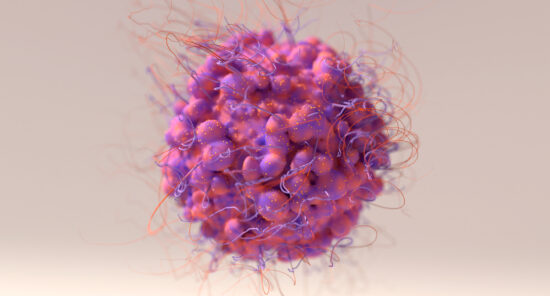Credit: Original article published here.In this episode of Healthcare Unfiltered: Dr. Chadi Nabhan hosts a duo of Canadiens to discuss quality of life and patient-reported outcomes in clinical trials: Christopher Booth, MD, and Michael Brundage, MSc, FRCPC, MD, both of Queen’s University. They begin by pontificating on whether quality of life is a “must” endpoint in designing interventional clinical trials today, the timeline of how “PROs” came to be a term and an important component of clinical trials, and much more.
Credit: Original article published here.Researchers of a study, published in Radiotherapy and Oncology, evaluated the effects of post-mastectomy radiation therapy in patients with HER-2 positive breast cancer based on pathological response to previous primary systemic therapy. The analyses used pooled data from the TRYPHAENA and NeoSphere randomized phase 2 trials. According to the study’s lead author, Omran Saifi, patients who achieved a complete nodal pathological response (ypN0) after primary systemic therapy had “excellent locoregional-control” that supported deescalation of post-mastectomy radiation therapy. Conversely, patients with ypN2-3 disease showed significant benefits with radiation therapy. Post-Mastectomy Radiotherapy Effect Per Nodal Status The analyses included 312 pooled patients with node-positive disease who were treated with HER-2-targeted primary systemic therapies, followed by mastectomy with or without subsequent radiation therapy. The primary end point was loco-regional recurrence-free survival (LRRFS). Researchers noted 172 (55%) patients achieved ypN0 response and 140 (45%) patients did not. Patients with ypN0 both with or without post-mastectomy radiation therapy had a 5-year LRRFS of 97% (P=.17). Patients with ypN1 disease (n=62) who received post-mastectomy radiation therapy (n=40) had a 5-year LRRFS of 89% compared with a LRRFS of 89% in those who did not receive radiation therapy (n=22; P=.60). In addition, authors found
Credit: Original article published here.The Oncology Brothers are joined by Dr. Margaret Gatti-Mays, of the Ohio State Comprehensive Cancer Center, to cover the current standard of treatment care in hormone receptor positive breast cancer. In this episode, Dr. Gatti-Mays walks through approach for treating women with this type of cancer using a treatment algorithm based on both disease stage (early stage, locally advanced, advanced/metastatic), and patient age (premenopausal vs. postmenopausal). Dr. Gatti-Mays expressed her excitement for being a breast oncologist based on “the amazing advancements that have occurred within the last couple of years.”
Credit: Original article published here.In this episode of The Fellow on Call: The Heme/Onc Podcast:Radiation oncology resident Dr. Ryan Miller, of Thomas Jefferson University Hospital, joins the group for the second time to discuss the critical role of radiation therapy in breast cancer management. Specifically, the group details the guidance breast cancer patients receive prior to undergoing radiation therapy, the standard radiation dosing administered to patients following breast cancer surgery, the common side effects of radiation therapy, and much more.
Credit: Original article published here.In this episode of Healthcare Unfiltered:Mike Rucker, PhD, a behavioral scientist and organizational psychologist, joins Dr. Chadi Nabhan show to discuss his writing and publishing of the book “The Fun Habit: How the Pursuit of Joy and Wonder Can Change Your Life.” Dr. Rucker explains how you can build having fun into an “actionable and effortless habit” and simultaneously reduce burnout. He shares why Americans have a difficult time enjoying themselves outside of work, what it means to “stop chasing happiness and start having fun,” and much more.
Credit: Original article published here.In this episode of The Fellow on Call: The Heme/Onc Podcast: The group kicks off a comprehensive series on breast cancer. In this episode, they are joined by special guest Dr. Yasha Gupta, from Memorial Sloan Kettering, to elucidate the role breast radiologists play in diagnosing and treating this widespread, and often complex malignancy. Here, you will learn the difference between a screening and diagnostic mammogram, the different techniques employed to perform a breast biopsy, and much more!
Credit: Original article published here.In this episode of Healthcare Unfiltered:How do you design clinical trials in the era of precision oncology? Are prospective randomized controlled trials necessary anymore? Drs. Ray Kurzrock, Vivek Subbiah, and Christopher Booth join Dr. Chadi Nabhan to answer these important questions.
Credit: Original article published here.DocWire News recently spoke with Dr. Richard Pitts, Chief Medical Officer of CalOptima Health, a major managed care plan in California on the health plan’s recent announcement of a ‘cancer moonshot’ for under resourced communities. CalOptima is investing a record $50 million over the next five years into 26 community health centers across Orange County in an effort to spur measurable improvements in patient experience and outcomes. See what Dr. Pitts had to say about this exciting news.
Credit: Original article published here.In this engaging episode, The Oncology Brothers welcome Dr. Jason Mouabbi, a breast medical oncologist from the MD Anderson Cancer Center, to better understand different histologies in hormone receptor-positive breast cancers, with a specific focus on invasive lobular carcinoma. This subtype of breast cancer, which is very different from the more common ductal carcinoma, as stated by Dr. Mouabbi, “is a very important [breast cancer subtype], that is largely misunderstood and understudied.”
Credit: Original article published here.In this episode of The Fellow on Call: The Heme/Onc Podcast: The group is excited to partner with a plethora of their podcasting friends as part of #NephMadness 2023. In this episode, Drs. Matthew Abrahamson, Dr. Timothy Yau, and Dr. Scott Stockholm discuss immune checkpoint inhibitor-related acute kidney injuries (AKIs), and hypomagnesia, two central topics in hemataology/oncology. The group details how checkpoint inhibitors work, the types of AKIs typically linked with immune checkpoint inhibitors, how to workup a suspected checkpoint inhibitor, and much more.









